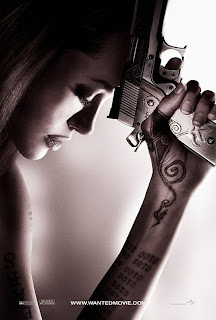Films of the Year (part 3) MORE DISAPPOINTMENTS
Continuing the film critic's privilege of somewhat pretentiously deciding which films didn't make the cut - not necessarily the worst movies of the year, just the most disappointing. While it takes almost as much effort to make a bad film as to make a good one, these 13 (see the previous post for the first 7) represent much less than the sum of their parts.
6: 10000 BC - Roland Emmerich makes disaster films. Some of them are fun ('The Day after Tomorrow'). Some of them are pretty bad ('Godzilla'). Some of them make you wish that the world would end if only so you could escape from the cinema.
5: Sex and the City - a movie that exists to provide space for product placement and superficial emoting by characters who remind me of what some fear most about human relationships: that ultimately, we cannot choose to be anything other than alone in our own personal hell.*
4: Eagle Eye - a film that wants to be 'North by Northwest' but ends up nothing more than a calling card for Shia la Boeuf (he's a talented kid, but I wish I hadn't fallen asleep and could believe the film was about more than it seems to be; it felt like I had paid for him to develop a the most well-made showreel in the history of the movies)
3: 21 - the only movie I walked out of this year. Even though I was there alone, I actually began to feel embarrassed for myself after about ten minutes of this literally by-the-numbers coming of age/college sex dramedy.
2: The Mummy: Tomb of the Dragon Emperor/Journey to the Center of the Earth - two Brendan Fraser films for the price of one (try 'Gods and Monsters' and 'Blast from the Past' for a far better evening's entertainment. They're listed here because they both, in their own small way (as John Geilgud might say) show contempt for the audience; one because it is a series of CGI effects strung together by nothing (and you can see the joins), the other because it was marketed as an exciting 3-D experience, but had nothing to offer the vast majority of audiences who had to settle for seeing it without the big glasses. The most short-changed I've felt at the movies this year.
1: Wanted - Easily my choice for the film this year that I most want to forget. This may seem controversial, because the movie is made with a great deal of craft, and so may not therefore deserve the criticism. But for me, the quality of a film is also determined by its cultural and moral vision; in that regard, 'Wanted', with its appropriation of nihilism-inflected-sexviolence, endorsement of the idea that physical attack is a better way to use your time than almost anything else, and its appetite for ultimate destruction gets my vote as the most morally empty, offensive, and distressing movie released in 2008.
To optimists among us: better news to follow.
*OK OK OK I know there's more to it than that, but there might also be less.

